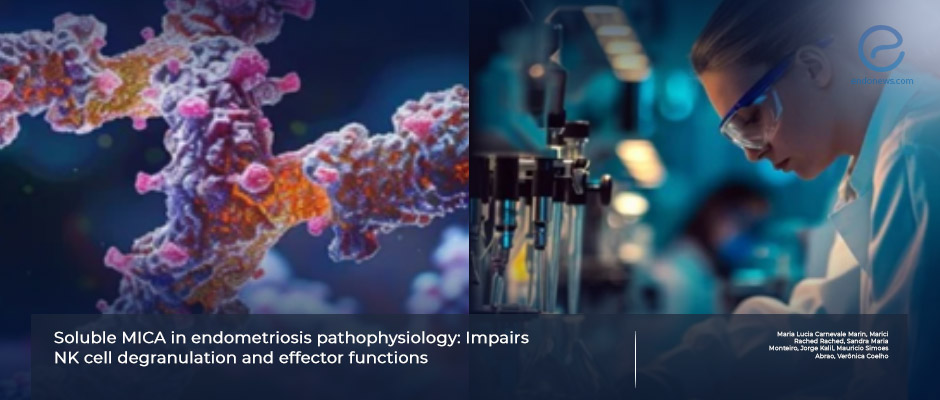A Key Modulator of Natural Killer Cell Dysfunction in Endometriosis: Soluble MICA
Oct 29, 2024
Elevated Soluble MICA in Endometriosis Impairs Natural Killer Cell Cytotoxicity
Key Points
Highlight
- Soluble MICA (MHC class I chain-related molecule A) impairs Natural Killer (NK) cell cytotoxicity in endometriosis, promoting disease progression and ectopic tissue viability.
Importance
- Understanding soluble MICA's role in NK cell dysfunction is key to unraveling the immune mechanisms of endometriosis and guiding targeted therapies.
What’s done here?
- Study enrolled 252 women undergoing laparoscopy, including 166 with histologically confirmed endometriosis and 86 controls.
- Blood and peritoneal fluid were collected, with peeripheral blood mononuclear cells isolated and analyzed, levels of sMICA in serum and peritoneal fluid were assessed.
- NK cell subsets were quantified, and the expression of its activating receptor was analyzed by flow cytometry.
- NK cell cytotoxicity and the expression of CD107a, IFN-γ, and IL-10 were evaluated following stimulation with K562 cells.
Key results
- Higher sMICA levels were detected in both serum and peritoneal fluid, particularly in advanced stages and deep endometriosis.
- Endometriosis was associated with lower percentages of cytotoxic NK cells and diminished responses upon stimulation, confirming impaired function.
- In conditions mimicking sMICA effects, NK cell cytotoxicity was decreased, along with a negative correlation between CD107a and sMICA levels in early-stage endometriosis.
- Overall, findings suggest that soluble MICA may play a significant role in the immune dysregulation observed in endometriosis, contributing to inadequate clearance of ectopic endometrial tissue.
Lay Summary
In a study published in the American Journal of the Reproductive Immunology, Abrao et al. investigated the potential effect of MHC Class I related MICA molecules at the pathogenesis of the endometriosis.
This study highlights a novel role of soluble MICA (sMICA) in endometriosis, showing its contribution to NK cell dysfunction and impaired immune response. Women with endometriosis exhibited elevated levels of sMICA, especially in advanced disease stages, correlating with reduced NK cell cytotoxicity and IFN-γ expression. This suppression of NK function likely contributes to the inadequate elimination of ectopic endometrial tissue, aiding disease persistence and progression.
Elevated sMICA in endometriosis appears to impair NK cell degranulation, with specific negative correlations observed between sMICA levels and CD107a expression on NK cells. Additionally, endometriosis patients showed altered IL-10 production in NK cells, suggesting both inflammatory and immunoregulatory disruptions. These findings underscore the systemic immune alterations in endometriosis, beyond localized sites, and highlight sMICA as a key player in NK cell-mediated immune dysregulation in the disease.
The most important point of that study is MHC I molecules and self-recognition mechanisms are still unrecognized field in endometriosis pathogenesis, disruptions in that pathway can lead to immune responses similar to GvHD (graft-versus-host disease), where the body fails to recognize endometrial cells as "self," promoting inflammation and tissue damage that exacerbate disease progression.
Research Source: https://pubmed.ncbi.nlm.nih.gov/38454570/
MHC Class I endometriosis IFN-γ IL-10 MICA NK cell cytotoxicity soluble MICA

